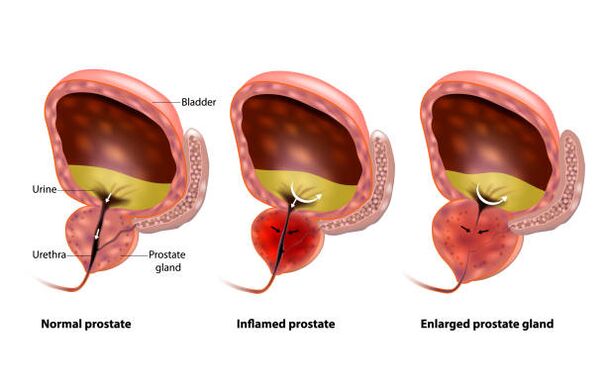At all times, men have faced the problem of erectile dysfunction. This insidious disease has no "age", it can appear even in young people. It is known that one of the causes of erectile dysfunction is chronic prostatitis. Therefore, due to such a close relationship between the two diseases, the approach to treating erectile dysfunction must be comprehensive.

What is erectile dysfunction?
Normal erectile function in a man includes the ability to get an erection strong enough to penetrate a woman's vagina and to maintain that erection long enough to complete intercourse.
Erectile dysfunction is the inability to obtain and / or maintain a penile erection sufficient for adequate intercourse. Loss of morning erection, premature ejaculation and lack of interest in sexual activity are the first signs. Smoking, drug use and alcohol abuse are known to play an important role in this problem. The risk of developing erectile dysfunction increases with comorbid conditions such as type II diabetes mellitus, obesity, cardiovascular disease, hypertension and dyslipidemia. However, the most common cause of erectile dysfunction are infectious diseases in the first place - prostatitis.
What is prostatitis?
Prostatitis is an inflammatory disease of the prostate gland. It can affect all men: those in monogamous or polygamous relationships and even virgins. Prostatitis is a very common pathology of the genitourinary system. Among the serious consequences of this disease can be called erectile dysfunction: many men mistakenly associate "failures" in sexual life with stress at work, fatigue and lack of sleep. But modern studies have shown that it is infectious diseases such as prostatitis that are most often the cause of the evils in sexual intercourse. Help to the urologist-andrologist.
The main symptoms of prostatitis
- Frequent urination
- Feeling of incomplete emptying of the bladder.
- Drawing pains and discomfort in the lumbar region, lower abdomen and perineum.
- Whitish or greenish discharge from the urethra.
- Pain and heaviness in the anus.
- Decreased libido and potency.
What is the connection between prostate inflammation and potency?
If the endothelium of the penis vessels is damaged by exposure to chronic diseases and toxins, this leads to a decrease in erection.
However, there is another version: most doctors believe that sexual disorders in prostatitis are, as a rule, psychological in nature. Constant and exhausting pains cause depression and increased anxiety, unpleasant symptoms, and chronic pain syndrome affects not only the general well-being, but also the mood of a man, brings him stress and discomfort. However, most modern urologists are of the same opinion: the cause of erectile dysfunction lies in organic damage to internal organs.
The importance of the prostate gland in the erection process
Erection from the point of view of normal physiology is due to complex neurovascular mechanisms, with several central and peripheral neurological mechanisms involved as well as molecular, vascular, psychological and endocrinological factors, and the balance between them is what ultimately determines theof the penis.
An erection is not a mechanical act that can be used as a hydraulic jack for lifting at any time. It is a subtle physiological process that begins with a stimulus perceived by the brain and that arises from visual perception, smell, sensation or touch.
A person's sensitivity to this sexual stimulus largely depends not only on his level of the hormone testosterone, but mainly on its conversion into the active metabolite dihydrotestosterone, which is formed inside a healthy prostate under the influence of an enzymecalled alpha reductase. And if problems arise with the prostate gland, as a result, problems with the metabolite will appear, which along the chain will pull difficulties during intercourse.
Restoration of potency and prostate damage therapy
If erectile dysfunction has arisen against the background of an infection, no drugs will help here - it is necessary to remove the underlying cause. Bacterial prostatitis, like any infection, is treated with antibiotics. However, it is very difficult and sometimes impossible for antibiotics to create the necessary concentration of drugs in the prostate, at the center of the infection. This is due to the fact that due to inflammation and swelling of the prostate, the blood supply is significantly reduced. Only complex treatment will be effective: a combination of drugs and physiotherapy, which improves the blood supply to the prostate gland, relieves its swelling. The doctor can prescribe courses such as extracorporeal magnetic stimulation, vibromagnetolaser massage, sinusoidal modulated currents, shock wave therapy, ozone therapy. If the doctor prescribed the correct treatment, and the man followed all the appointments and recommendations, then with the elimination of inflammation in the prostate, violations in sexual life disappear without a trace.
Prophylaxis
- Regular sexual life (this is a purely individual problem, but up to 30 years of age, the frequency of sexual intercourse 2-3 times a week is considered the norm).
- Respect for hygiene during sexual intercourse.
- A healthy lifestyle.
- Exclusion of injuries and hypothermia.
- Regular urological examination (at least once a year for men over 40).
A person's recommended lifestyle should include regular exercise, adequate sleep, quitting smoking, a balanced diet with an emphasis on Mediterranean cuisine, and moderate alcohol consumption.
To feel male strength for as long as possible and maintain a high quality of life, when the first unpleasant symptoms appear, do not delay a visit to a qualified urologist-andrologist. Undergo a complete urological examination, get an accurate diagnosis and effective treatment.
































